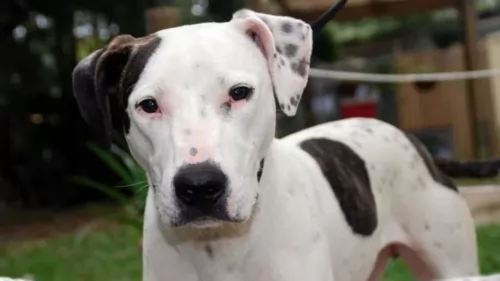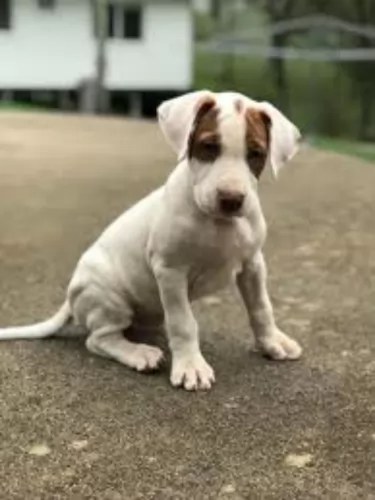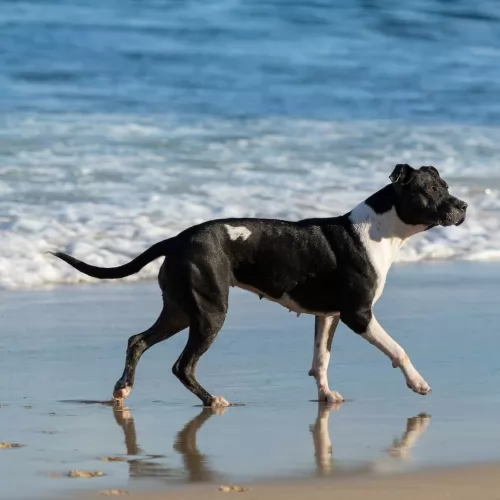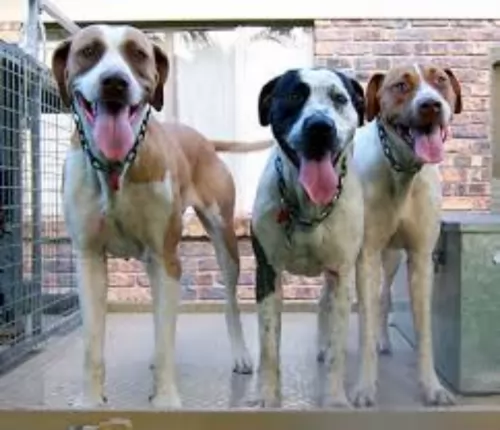 Petzlover
Petzlover Bull Arab is originated from Australia but Leonberger is originated from Germany. Bull Arab may grow 11 cm / 4 inches shorter than Leonberger. Bull Arab may weigh 27 kg / 59 pounds lesser than Leonberger. Bull Arab may live 5 years more than Leonberger. Bull Arab may have less litter size than Leonberger. Bull Arab requires Low Maintenance. But Leonberger requires Moderate Maintenance
Bull Arab is originated from Australia but Leonberger is originated from Germany. Bull Arab may grow 11 cm / 4 inches shorter than Leonberger. Bull Arab may weigh 27 kg / 59 pounds lesser than Leonberger. Bull Arab may live 5 years more than Leonberger. Bull Arab may have less litter size than Leonberger. Bull Arab requires Low Maintenance. But Leonberger requires Moderate Maintenance
 In the 1970’s feral pig hunters wanted a dog that could be aggressive in finding and capturing the pigs. The hunters crossed the German Shorthaired Pointer, the Bull Terrier and the Greyhound to develop the Bull Arab. It is believed that the hybrid is at least 50% Bull Terrier. It is also possible that there is some Doberman, Mastiff, Great Dane and/or Pointer in the hybrid as well.
In the 1970’s feral pig hunters wanted a dog that could be aggressive in finding and capturing the pigs. The hunters crossed the German Shorthaired Pointer, the Bull Terrier and the Greyhound to develop the Bull Arab. It is believed that the hybrid is at least 50% Bull Terrier. It is also possible that there is some Doberman, Mastiff, Great Dane and/or Pointer in the hybrid as well.
The job of the Bull Arab is to hunt out the feral pigs, grab one by the ear and hold it until the hunter arrives. They have a strong sense of smell and that is how they find the pigs.
Mike Hodgens, an Australian, developed the hybrid and added some Bloodhound as well to get that ability to smell out the pigs at great distances. They are also capable of catching buffalo and cattle. Some Australians use the breed in cattle or buffalo ranching. They are registered with the DRA or Dog Registry of America, Inc.
 Hailing from Germany, and more specifically the city of Leonberg, the Leonberger is a giant dog breed.
Hailing from Germany, and more specifically the city of Leonberg, the Leonberger is a giant dog breed.
A resident of Leonberg, Germany, was looking to develop a dog that resembled a lion and in 1846 it was announced that such a dog had been developed by crossing a Newfoundland, Saint Bernard and Pyrenean Mountain dog.
It was after 2010, when the Leonberger Club of America joined the American Kennel Club, that the strict breeding rules were no longer mandatory for all Leonbergers.
 Mike Hodgens succeeded in developing a powerful, well built dog. The Bull Arab has a powerful head and muzzle. He has moderate length drop ears and bright eyes that match the color of his coat. His chest is neither shallow nor deep and his back is straight and strong. Their tails are tapered and pointed yet the base is thick. They are a double-coated dog. They can be white with black, tan or liver, flecked or bicolor.
Mike Hodgens succeeded in developing a powerful, well built dog. The Bull Arab has a powerful head and muzzle. He has moderate length drop ears and bright eyes that match the color of his coat. His chest is neither shallow nor deep and his back is straight and strong. Their tails are tapered and pointed yet the base is thick. They are a double-coated dog. They can be white with black, tan or liver, flecked or bicolor.
 As a giant breed, the Leonberger stands at between 65cm and 80cm in height. He weighs a hefty 40 – 77kg both males and females.
As a giant breed, the Leonberger stands at between 65cm and 80cm in height. He weighs a hefty 40 – 77kg both males and females.
These dogs are described as being dimorphic. It means that there is quite a difference in the looks of the males and females, with the male dogs being heftier and larger than the females.
The head of the dog is large, he has almond-shaped, dark brown eyes and the ears are medium sized and floppy. The tail is long and he has webbed feet which makes him a good swimmer too.
The thick, double coat can be straight or wavy and comes in different colors such as reddish-brown, tan, sandy or yellowish and the hairs can be tipped with black. He sheds quite a bit so will need regular brushing.
The Leonberger can have between 6 – 14 puppies and these puppies are like big, fat, cuddly, fluffy teddy bears. Don’t be tempted to just buy one because of his wonderful looks because they turn out to be huge dogs that eat a lot and the coat can take quite a bit of effort to keep groomed.
Fondly referred to as the Leo, this giant beautiful dog is social and in spite of his size, he should never be left alone in the backyard for long periods of time. He needs to come indoors from time to time to enjoy some interaction with his human family.
He is a family dog, and with training and socialization, he becomes a well-rounded, confident, obedient pet, quiet and content and sensitive to his owner’s moods.
Even though he becomes a great family pet, you need to think twice before you decide to own one of these large dogs as he can be costly to feed.
 The Bull Arab is intelligent, calm and loyal. Like Pit Bulls in the U.S., the Bull Arab has a reputation for aggression against both people and animals. There is no data to support these claims. They have been used as therapy dogs and companion animals very successfully. They are great with kids and very affectionate. The breed is cited as being used for companion and therapy animals
The Bull Arab is intelligent, calm and loyal. Like Pit Bulls in the U.S., the Bull Arab has a reputation for aggression against both people and animals. There is no data to support these claims. They have been used as therapy dogs and companion animals very successfully. They are great with kids and very affectionate. The breed is cited as being used for companion and therapy animals
 Don’t be deceived by the looks of the big Leonberger because he isn’t aggressive, but quiet and calm. Large he may be, but he isn’t sluggish either and he will certainly require exercise such as a long, fairly lively walk every day.
Don’t be deceived by the looks of the big Leonberger because he isn’t aggressive, but quiet and calm. Large he may be, but he isn’t sluggish either and he will certainly require exercise such as a long, fairly lively walk every day.
They’re intelligent dogs too and respond well to socialization and training. He is a social dog and wants to enjoy plenty of interaction with his human family members.
These dogs are often used as rescue- and therapy dogs as they are so loving and sensitive. Give him lots of love and good care and you’re going to have the most wonderful pet that lives up to the saying – dogs are man’s best friend.
 Leonbergers are strong, generally healthy dogs. It is said that very large dogs like this don’t live as long as smaller dogs and they also face more health issues. Orthopedic issues such as hip dysplasia are more common with large breeds.
Leonbergers are strong, generally healthy dogs. It is said that very large dogs like this don’t live as long as smaller dogs and they also face more health issues. Orthopedic issues such as hip dysplasia are more common with large breeds.
An orthopedic problem like this is a misalignment of a joint. This large dog also tends to develop elbow dysplasia too. Fortunately today, hip- and elbow dysplasia is controlled because of efforts of breeders to have their Leonbergers screened.
Nonetheless it is important to know about this ailment. The word ‘Dysplasia’ is referring to an abnormality of development. With both hip- and elbow dysplasia, there is abnormal development of the joints, and osteoarthritis can build up, causing lameness for your giant canine.
Cancer is sadly a leading cause of death in dogs over the age of 10 years. Lymphoma is a blood-related cancer – a tumor of the lymph nodes. Dogs can develop different forms of lymphoma. The warning signs are a lump or a wound that won’t heal, swelling in the bone and abnormal bleeding.
Luckily cancer is very treatable in dogs, but you need to get your dog to the vet as soon as possible.
 This is a working dog so he needs to eat the right kind of quality dog food. In order to avoid bloat do not feed large meals but rather feed one to two cups of food two to three times a day.
This is a working dog so he needs to eat the right kind of quality dog food. In order to avoid bloat do not feed large meals but rather feed one to two cups of food two to three times a day.
Hunting Accidents – this is the biggest reasons for health problems with the Bull Arab.
These are working dogs that are inactive when not working. They need a lot of exercise if they are not used for hunting. Agility, Tracking and hunting games, and field trials.
 That long coat of the Leonberger is going to require some brushing at least twice a week. He is also a moderate shedder and you want to get rid of all that loose hair and to keep him looking well groomed.
That long coat of the Leonberger is going to require some brushing at least twice a week. He is also a moderate shedder and you want to get rid of all that loose hair and to keep him looking well groomed.
A proper, nutritious diet is an essential part of having healthy, happy dogs and if you’re unsure about how to feed your giant pet, speak to your veterinarian.
The best diet for dogs is always very debatable, but essentially it needs to be kept simple. Try and invest in the very best commercially manufactured dog food for large breeds. Every dog wants a tasty home-made morsel from time to time. Add in cooked chicken, brown rice as well as cooked or raw vegetables. Raw meat can also be added in from time to time.
You want to avoid feeding the Leonberger puppy a high protein diet as this encourages rapid growth and you want to avoid that.